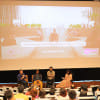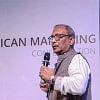BRACU holds 3-day international conference on the evolution of language education

A three-day international conference titled "Language Metamorphosis: Implications for Language Education in Decolonial Contexts" (LMLEDC) organised by the BRAC Institute of Languages (BIL) began at BRAC University on November 28.
This event aims to analyze the transformative shifts in language education shaped by colonial legacies and explore their global impact on teaching methodologies and learning practices.
The conference has brought together over 300 scholars, language practitioners and students from Bangladesh and around the world to discuss critical themes, including multilingual education, language policy, linguistic diversity, and decolonial approaches to education.
It features six distinguished keynote speakers, four distinguished scholars, two talented academics, two plenary sessions, two colloquium sessions, and 151 presentations, promising academic exchanges and impactful discourse.
The inauguration ceremony was attended by Professor Dr Bidhan Ranjan Roy Poddar, Adviser, Ministry of Primary and Mass Education, as the Chief Guest.
Dr Salimullah Khan, Professor, General Education Program, University of Liberal Arts Bangladesh, delivered remarks as the guest of honour. Other notable attendees included Professor Ferhat Anwar, Vice-Chancellor, BRAC University; Professor Syed Mahfuzul Aziz, Pro Vice-Chancellor, BRAC University; Professor Mohammad Ashaduzzaman, Director, International Mother Language Institute; Tamara Hasan Abed, Chairperson, Board of Trustees, BRAC University; Lady Syeda Sarwat Abed, Adviser and Founder of BIL; and Dr Shaila Sultana, Director, BIL and Convenor of the conference.
Lady Syeda Sarwat Abed, in her opening remarks, shared Sir Abed's vision of BRAC University as a centre for holistic education, shaping students into changemakers. She highlighted the BRAC Institute of Languages (BIL) for its role in knowledge creation and promoting multilingualism as a bridge to global understanding.
Professor Dr Poddar emphasised that Bangla represents our identity and aspirations, urging that multilingualism should not overshadow our mother tongue. He praised the BRAC Institute of Languages (BIL) for its innovation and inclusivity in linguistic education and highlighted the conference as a key platform for generating ideas and solutions to advance this field.
Professor Khan highlighted that the conference should foster discussion and idea exchange, rather than seeking unanimous agreement. While advocating for improved literacy rates, he expressed concern that relying solely on foreign languages may not suffice. He acknowledged the global importance of English but stressed that inclusive education must prioritise linguistic diversity, with the mother tongue at the forefront to ensure accessibility for all.
Tamara Hasan Abed underscored the need to advocate for curricula that foster linguistic diversity, ensuring that education becomes a tool for inclusivity and cultural preservation.
Professor Syed Ferhat Anwar expressed his hope that the conference would become a platform for the democratization of knowledge through language. He underscored the significance of cultivating empathy and respect for linguistic diversity in achieving this goal.
In her closing remarks, Professor Shaila Sultana outlined the key highlights of the three-day conference and expressed her gratitude to all attendees for their efforts in making the event a success.
The keynote speakers of the conference included Professor Suresh Canagarajah, Evan Pugh University Professor of Applied Linguistics, English, and Asian Studies at Pennsylvania State University, USA; Professor Stephen May from the Faculty of Education and Social Work at the University of Auckland, New Zealand; and Professor Sender Dovchin, Senior Principal Research Fellow at Curtin University, Australia.
The other three speakers joined online. They are Professor Sirpa Leppänen, Professor Emeritus, Department of Language and Communication Studies, University of Jyväskylä, Finland; Professor Emeritus Robert Phillipson, Department of Management, Society and Communication at Copenhagen Business School, Denmark; and Professor Alastair Pennycook, PhD, Professor Emeritus, University of Technology Sydney, Australia.

 For all latest news, follow The Daily Star's Google News channel.
For all latest news, follow The Daily Star's Google News channel. 








Comments